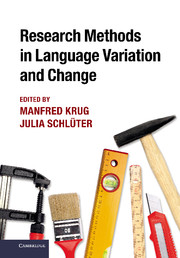23 - Analysing aggregated linguistic data
Published online by Cambridge University Press: 05 June 2014
Summary
Introduction
Aggregate data analysis – also known as data synthesis, mass data analysis, or, especially in biology, (numerical) taxonomy – is concerned not with the distribution of individual features, properties, or measurements, but with the joint analysis of multiple characteristics. Aggregate data analysis is a methodical cornerstone in many academic disciplines: taxonomists, for instance, typically categorize species not on the basis of a single morphological or genetic criterion, but of many; economists assess macroeconomic changes not on the basis of individual macroeconomic indicators (unemployment, say), but also consider inflation, GDP per capita, interest rates, and so on. Outside academia, aggregate data analysis is quite customary in fields such as marketing research and consumer creditworthiness modeling.
By contrast, in the realm of linguistics and particularly in variationist linguistics, there is a long and strongly entrenched tradition of looking at individual features in isolation rather than at feature aggregates. This is why we find an abundance of what Nerbonne (2008) has referred to as ‘single-feature-based studies’ in the pertinent literature. Browse through the discipline’s flagship journals and you will find a great many studies with dauntingly specific titles such as The glottal stop in language A, Auxiliary contraction in variety B, The use of abstract nouns in register C, or Quotatives in sociolect D. It is, essentially, only in three linguistic subfields that we find aggregate data analysis employed on a regular basis: in the study of cross-linguistic typology and language universals (for instance, Greenberg 1963), in dialectometry (Séguy 1971; Goebl 1982; Nerbonne, Heeringa and Kleiweg 1999), and multidimensional register studies in the spirit of Biber (1988; see also Biber and Gray, Chapter 21, this volume).
Information
- Type
- Chapter
- Information
- Research Methods in Language Variation and Change , pp. 433 - 455Publisher: Cambridge University PressPrint publication year: 2013
References
Accessibility standard: Unknown
Why this information is here
This section outlines the accessibility features of this content - including support for screen readers, full keyboard navigation and high-contrast display options. This may not be relevant for you.Accessibility Information
- 5
- Cited by
